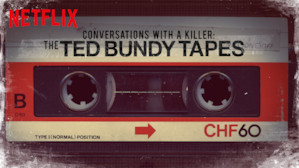From 1974 to 1978, infamous serial killer Ted Bundy murdered more than 30 women in seven different states. His atrocities have been studied for years, but in this 2018 Netflix docuseries, director Joe Berlinger focuses on how Bundy escaped notice because of his seemingly normal, attractive appearance. Several key investigators are interviewed, and the film also intercuts clips and interviews with Stephen G. Michaud, a reporter who interviewed Bundy while he was on death row. Throughout the series, Bundy’s chilling voice describes what he must have been thinking while committing these crimes.
The docuseries follows what Bill Nichols calls the participatory mode of documentary filmmaking, relying on interviews to supplement archival footage. Berlinger himself is an entirely absent voice from the series itself, so that the series can focus on the perception of Bundy by the public. Berlinger shows the viewer several moments in the film where Bundy himself was doubted as the killer, both by normal citizens and police officers. Early in Bundy’s crimes, for instance, one witness provided a description of him and heard him identify himself as Ted to the woman who had later been murdered. She also saw the car Bundy was driving. The police, now holding this information, brought in several “Teds” including Bundy. Officers then released Bundy, due to a lack of evidence or prior arrests. Berlinger includes this to show the viewer that police weren’t looking for a normal-looking individual, but someone with a history of violence.
The inability of the investigators to perceive Bundy as a potential suspect is echoed by scenes later in the series where Bundy is on trial and a news channel interviews a woman outside saying he could not have done it. They say his good looks and charm make him seem innocent; some even say he might not be innocent, but they still think he’s attractive and would risk an attack for some time with him. These moments are used to show the unique and unprecedented nature of the case. With other serial killers, a clear mental problem often made them stick out; but Bundy, however, came across as just a normal guy, making his case much eerier for prosecutors and viewers alike.
When creating a documentary on a murderous individual, like Bundy, the filmmaker faces ethical questions immediately– should a film with this subject be made? Creating a docuseries like this can be painful to those that survived and the families of those affected. And interestingly, Berlinger opted to create two films focusing on Bundy: first this docuseries, and secondly, his biopic of Bundy, Extremely Wicked, Shockingly Evil and Vile, told through the eyes of his girlfriend, Elizabeth Kleopfer and starring former teen hearthrob Zac Efron, was just released on Netflix.
The docuseries, though, serves as both a history lesson and cautionary tale. It shows how Bundy got away with it for so long to convey the message that anyone can be a killer. Just because someone looks and acts normal, doesn’t mean they are not hiding a dark secret. Another important ethical question the filmmaker must address is how to show the subject of the film. It would be easy to show Bundy in the worst ways in light of his actions. However, Berlinger seems to take no side in the way he portrays Bundy. Most interviews involve a subject who conveys the facts of the case. A few interviewees show their disgust for Bundy just in the way they speak of him and Berlinger matches this by showing footage of those who knew Ted positively.
It is clear, through the director’s choices, that for most of the docuseries he wants us to see Ted Bundy in the same light the public would have in 1978, by showcasing negative, positive, and strictly factual accounts of Ted Bundy and his crimes. Toward the end of the series when Bundy is in the courtroom being sentenced for his crimes, Berlinger shows us the verdict delivered, where Judge Edward Cowart called his actions “Extremely wicked, shockingly evil and vile.” Berlinger then lets the clip continue to where the judge tells Bundy he’s a bright young man and wishes that he gets better in the future.
Conversations with a Killer: The Ted Bundy Tapes showcases the rarity of Bundy’s case, while also presenting strong ethical considerations for filmmaker Joe Berlinger. Given two recent films on the subject–and one of them featuring a handsome, charismatic star–Bundy’s resurgence in the public eye can be attributed in large part due to the work of Berlinger. It is important to remember individuals like Ted Bundy and their negative actions in an effort to stop the past from repeating itself. But it is equally important not to praise or idolize them for their notoriety. Conversations with a Killer balances the apparent attractions of its subject with the atrocities he committed.
Conversations with a Killer is currently streaming on the subscription service Netflix.


Recent Comments